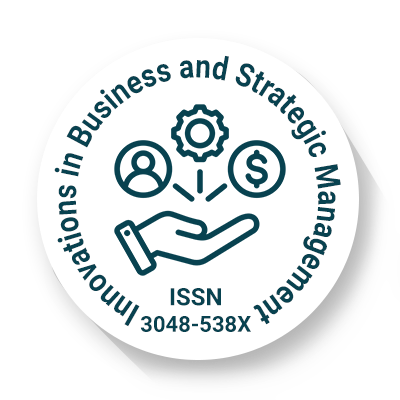
Innovations in Business and Strategic Management
OPEN ACCESS
ISSN: 3048-538X

OPEN ACCESS
ISSN: 3048-538X
Management is at the heart of corporate performance, orchestrating resources, strategies, and human potential to achieve company goals efficiently. It is not merely about administration; it is a multifaceted discipline that includes planning, implementation, leadership, and continual development. Effective management promotes an innovative culture, ensuring that organizations stay competitive, resilient, and adaptive in a rapidly changing global context.
A key component of management is strategic planning, in which executives set goals, distribute funds, and create a plan for long-term expansion. Direction is given by a well-organized management system that also permits flexibility to adjust to changing market conditions. While increasing productivity and efficiency, it guarantees that business operations are in line with long-term objectives. By using data to inform their decisions, managers may identify patterns, foresee problems, and put solutions in place that promote organizational performance.
Management innovation is critical for long-term corporate success. The ability to think beyond traditional approaches and embrace new-age ideas is what distinguishes innovative enterprises. Modern management methods prioritize agility, collaboration, and technological integration in order to streamline workflows and improve performance. Digital transformation, automation, and artificial intelligence have altered management practices, allowing businesses to optimize operations while remaining customer-centric.
People management is another important aspect of company excellence. Employees are the foundation of any firm, and successful management cultivates talent, promotes skill development, and maintains an inclusive workplace culture. A robust managerial framework encourages teamwork, open communication, and employee engagement, resulting in increased production and job satisfaction. Leaders who promote employee well-being foster a culture in which employees feel appreciated, empowered, and motivated to contribute to the organization's success.
Financial management is critical for long-term business growth. Prudent financial planning, budgeting, and risk assessment are critical for financial stability and profitability. Managers must make sound financial decisions that balance investment and spending while guaranteeing long-term financial stability. Effective financial management not only increases profitability but also protects firms from economic downturns.
Furthermore, ethical management and corporate governance are critical for establishing a trustworthy and respected organization. Organizations that operate with openness, honesty, and social responsibility gain credibility and loyalty from their stakeholders. Ethical decision-making ensures conformity with legal laws while additionally having a beneficent impact on society. In the era of conscious consumerism, businesses that adhere to ethical standards acquire a competitive advantage in the market.
Different management styles address various organizational needs. Autocratic management emphasizes authority and directive leadership, whereas democratic management promotes participatory decision-making and collaboration. Transformational management promotes change and creativity, while transactional management focuses on structure and efficiency. The most effective managers tailor their approach to business objectives, industry demands, and staff characteristics.
Management is a strategic discipline that encompasses planning, execution, leadership, financial oversight, and ethical governance. It enables businesses to adapt, innovate, and thrive in competitive markets. As the corporate landscape evolves, effective management remains crucial for long-term success. Innovations in Business and Strategic Management contribute to this field by publishing insightful research on modern management strategies, helping organizations navigate challenges and drive sustainable growth.